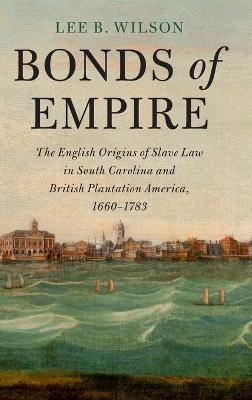
Bonds of Empire
The English Origins of Slave Law in South Carolina and British Plantation America, 1660–1783
Seiten
2021
Cambridge University Press (Verlag)
978-1-108-49525-7 (ISBN)
Cambridge University Press (Verlag)
978-1-108-49525-7 (ISBN)
Bonds of Empire reveals how English law facilitated the expansion of slavery in British America. Moving beyond an examination of criminal law, the book suggests that plantation slavery and the laws that governed it were not beyond the pale of English imperial legal history.
Bonds of Empire presents an account of slave law that is entirely new: one in which English law imbued plantation slavery with its staying power even as it insulated slave owners from contemplating the moral implications of owning human beings. Emphasizing practice rather than proscription, the book follows South Carolina colonists as they used English law to maximize the value of the people they treated as property. Doing so reveals that most daily legal practices surrounding slave ownership were derived from English law: colonists categorized enslaved people as property using English legal terms, they bought and sold them with printed English legal forms, and they followed English legal procedures as they litigated over enslaved people in court. Bonds of Empire ultimately shows that plantation slavery and the laws that governed it were not beyond the pale of English imperial legal history; they were yet another invidious manifestation of English law's protean potential.
Bonds of Empire presents an account of slave law that is entirely new: one in which English law imbued plantation slavery with its staying power even as it insulated slave owners from contemplating the moral implications of owning human beings. Emphasizing practice rather than proscription, the book follows South Carolina colonists as they used English law to maximize the value of the people they treated as property. Doing so reveals that most daily legal practices surrounding slave ownership were derived from English law: colonists categorized enslaved people as property using English legal terms, they bought and sold them with printed English legal forms, and they followed English legal procedures as they litigated over enslaved people in court. Bonds of Empire ultimately shows that plantation slavery and the laws that governed it were not beyond the pale of English imperial legal history; they were yet another invidious manifestation of English law's protean potential.
Lee B. Wilson is Assistant Professor of History at Clemson University. A historian of colonial British America and the early modern Atlantic world, her research interests include the legal history of early American slave societies, colonial property law, and legal discourse.
List of Tables; Acknowledgements; A Note on Text; List of Abbreviations; Introduction; 1. Chattel; 2. Bonds; 3. In Rem; 4. Equity; 5. Res Publica; Conclusion; Index.
| Erscheinungsdatum | 16.07.2021 |
|---|---|
| Reihe/Serie | Cambridge Historical Studies in American Law and Society |
| Zusatzinfo | Worked examples or Exercises |
| Verlagsort | Cambridge |
| Sprache | englisch |
| Maße | 158 x 235 mm |
| Gewicht | 590 g |
| Themenwelt | Geisteswissenschaften ► Geschichte ► Regional- / Ländergeschichte |
| Geschichte ► Teilgebiete der Geschichte ► Militärgeschichte | |
| Recht / Steuern ► Rechtsgeschichte | |
| ISBN-10 | 1-108-49525-7 / 1108495257 |
| ISBN-13 | 978-1-108-49525-7 / 9781108495257 |
| Zustand | Neuware |
| Haben Sie eine Frage zum Produkt? |
Mehr entdecken
aus dem Bereich
aus dem Bereich
neueste Manipulationstechniken als Waffengattung der NATO
Buch | Softcover (2023)
Westend (Verlag)
24,00 €


